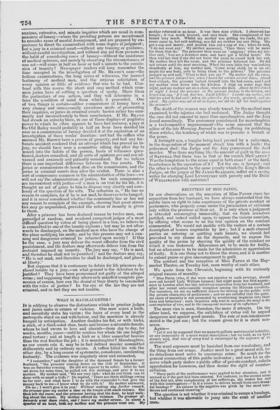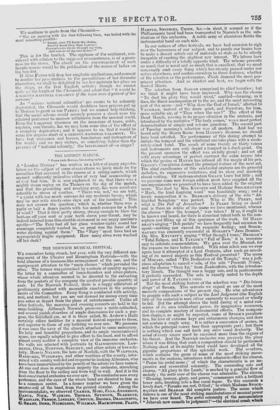RECEPTION OF MISS PATON.
IN our observations on the reception of Miss PATON since her separation from her husband, we have always contended that the public have no right to take cognizance of the private conduct of performers, who properly come under the jurisdiction of criticism only within the province of their, art. It is only when a judgment is obtruded encouraging immorality, that we think ourselves justified, and indeed called upon, to oppose the vicious sanction, by offering what seems to us the true opinion on the conduct commended. We would not meddle with the visitors of a certain description of houses cognizable by law ; but if a mob cheered parties on entering or quitting such haunts, we should feel provoked to cry shame on the depravity, and to expose the quality of the praise by showing the quality of the conduct on which it was bestowed. Allowances are to be made for frailty, but no allowance is to be made for the admiration or approbation of frailty. It is one thing not to throw the stone, and it is another to extend praise or give encouragement to guilt. The conduct and the reception of Miss PATON at the Hay- market Theatre, on Tuesday last, seem worthy of each other.
We quote from the Chronicle, beginning with its curiously original canons of morality.
"Miss Paton (who, if she were not superior to such revenge, should now call herself Lady William Lennox) last night made her first appear- ance in London after her late notorious separation from her husband, and after her recent unfavourable reception among the Milesian moralists. For ourselves, we see no sufficient reason for mixing up the public with the private characters of performers' and we are satisfied that the gene- ral cause of morality is not promoted by scrutinizing inquiries into their lives and behaviour : such inquiries only tend to accustom the mind to the contemplation of vice, and to the consequent increase of its influence."
The more vice is seen, therefore, the more it attracts. On the other hand, we suppose, the exhibition of virtue will be argued dangerous and against good morals. The rule of non-interference stated is the just one ; but the reason given for it is stark non- sense.
Again- " Let it not be supposed that we mean to palliate matrimonial infidelity, or any immorality of a more venial description ; but we hold, as we have already said, that vice of every kind is encouraged by the exposure of its existence."
The word exposure must be banished from our vocabulary, and the thing from our usage. Justice must be a great moral evil, for its detections must serve to encourage crime. So much for the general commentary of this public instructor ; and now let us ob- serve which party makes a public affair of private conduct, solicits approbation for looseness, and then denies the right of counter- criticism.
"Many parts of the performance were applied to her situation, and it seemed as if the part had been selected. For instance, in the second scene of the first act, after complaining of her sufferin gs, she makes her exit with this interrogatory—' Is it a crime to deliver myself from such dread- ful bondage ?' An answer in the negative was given by the most voci- ferous and continued cheering."
The question is not whether it was criminal to escape abondage, but whether it was allowable to jump into the arms of another man.' We continue to quote from the .Chroniele- " The air opening with the four following lines, was hailed with the most animating plaudits : Tyrant, soon ill burst thy chains,
Sweeter bonds than thine to prove; Passion's voice thrills through my veins, And wakens all my soul to love.'"
This is for the brothel. The applause of the sentiment, con- sidered with relation to the supposed circumstances, is of a gross- ness for the stews. The check on the encouragement of such licentiousness would be the publication of the names of ladies on the box-list. .
If Miss EATON will drop her emphatic applications, and consent to confine her presentations to the presentations of her dramatic characters, we shall be delighted to see her maintain her place on the stage, as the first English artiste; though we cannot quite go the length of the Chronicle, and admit that "it would be A SERIOUS NATIONAL CALAMITY if the town were deprived of her services."
As " serious national calamities" are events to be solemnly deprecated, the Chronicle would doubtless have prayers put up to Heaven to grant us our PATON ; but we cannot help thinking, that the social scheme would scarcely perceive a shock were the admired performer to-morrow withdrawn from the musical world. From the temporary absences on the occasions of tours, colds, caprices, sore throats, &c. we may form some idea of the effect of a complete deprivation ; and it appears to us, that it would be some few degrees short of a SERIOUS NATIONAL CALAMITY. We have lost statesmen and heroes, benefactors and instructors of the world ; and we may endure, as something lighter than the pressure of "national calamity," the bereavement of—a singer



























 Previous page
Previous page